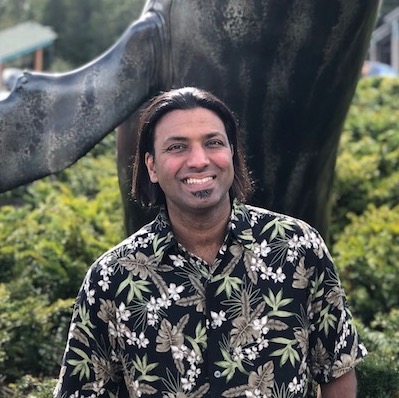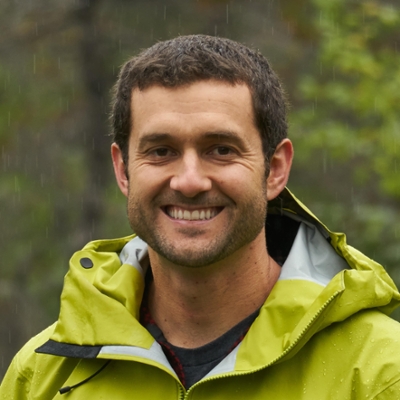Environmental Science, Resources & Studies
A Natural Laboratory Perfect for Study
Part of the UAS Environmental Science, Resources & Studies, the interdisciplinary curriculum in the BS in Environmental Science and BS in Environmental Resources degrees is designed to prepare students for science-based careers in environmental research, management, and consulting. Students completing either of the degrees will have opportunities for hands-on field experience in the glacial and rainforest environments of Southeast Alaska.
Faculty in these fields of study instruct in a variety of disciplines including: the earth sciences, chemistry, physics, biology, math, and spatial analysis. Students learn biological principles and skills in lecture, laboratory, and field courses. A particular emphasis of the program is student involvement in research projects, and undergraduates in Environmental Science regularly present their research results at regional and national scientific meetings.
Our faculty are actively engaged in research programs in areas including: landscape ecology, hydrology, sensor development, geology, environmental chemistry, geochemistry, remote sensing, glaciology, and biogeochemistry.
Blog
Summer Position - Ranger at Pack Creek Bear Viewing Area, US Forest Service
Hi All,
The USFS is looking to hire 2 rangers to work at the Pack Creek Bear Viewing Area next summer. These positions are being advertised as ANILCA positions, meaning that applicants must have been in or near the geographic boundaries of the Tongass National Forest in SE Alaska for at least 6 months during April-September. Applicants must also demonstrate knowledge or expertise concerning the natural and cultural resources in Southeast Alaska area to participate in natural resources.
The application deadline is Jan. 26th, and you can reach out to Chrissy Post with questions (see below). There are also more details on the job in the attached flier.
----
Position open January 14-26th 2026 at https://www.usajobs.gov/GetJob/ViewDetails/854368200.
Please feel free reach out to Wilderness Manager Chrissy Post in Juneau, AK if you have any questions about the position or the application process!
Contact information: phone: 907-789-6231
email: Christine.post@usda.gov
----
Cheers,
Eran
Pack Creek 2026 Anilca outreach
|
Summer positions with National Park Service - Physical Science and Cartography
Hi All,
The National Park Service is hiring two technician positions in Juneau (as well as other locations in Alaska) for next summer. One position is in physical science and one is in cartography. Details on the poisitions and instructions for applying can be found at the web links below. Note that the closing date for applications is next week.
Cheers,
Eran
----------
Please share the following NPS physical science and cartographic seasonal technician positions with any students that may be interested. Note that there are Juneau duty station positions for both job series.
The following temporary 1039 DEU (all U.S. Citizens) announcements opened on USAJobs.gov today, 12/15/2025, and are scheduled to close 12/24/2025.
-
Physical Science Technician, GS-05/06/07: https://www.usajobs.gov/GetJob/ViewDetails/852397800
-
Cartographic Technician, GS-1371-07: https://www.usajobs.gov/GetJob/ViewDetails/852293300
National Park Service Biological Technician Positions - Summer 2026
Hi All,
The National Park Service is hiring Biological Technician positions in Alaska for next summer. Details on the positions and how to apply are below. APPLICATIONS ARE DUE THIS FRIDAY (12/12).
Cheers,
Eran
---
The National Park Service seasonal biological technician positions for summer 2026 just opened today on USA jobs and will be open through 12/12/2025.
The links for all positions are listed below for park units across Alaska, including positions in Juneau with the NPS-Southeast Alaska Network that would work on projects in Glacier Bay NP, Wrangell-St. Elias NP, Sitka NP, and Klondike, NP, and Juneau.
https://www.usajobs.gov/job/851759200
Please share with students that may be interested. Feel free to reach out if you have questions.
Thanks for your help.
Jamie
Jamie N. Womble, Ph.D.
Supervisory Biologist & Program Lead
National Park Service
Glacier Bay Field Station
Hiring Stream Habitat Assessment Technicians for Summer 2026
Hi All,
The Alaska Center for Conservation Science is hiring field technicians for next summer. See details below.
Cheers,
Eran
-------
The Alaska Center for Conservation Science at the University of Alaska - Anchorage is hiring multiple temporary (seasonal) field technicians to help implement the Bureau of Land Management’s (BLM) lotic Assessment, Inventory, and Monitoring (AIM) sampling in the Arctic-Yukon-Kuskokwim region. Technicians will help sample stream habitat conditions in remote Alaska throughout summer 2026 and will be required to work in the backcountry for long hours at mainly helicopter-access sites.
Anyone can apply, but the techs will be moving around a lot over the summer, so being Anchorage or Fairbanks based is helpful. We will be sampling in the Brooks Range, so it should be an extra fun year to be a part of the crew!
Application link:
Paid student research experience in Alaska
Hi All,
See below and attached flyer for information about a paid student research experience for college students in Alaska.
Info is here: https://nna-co.org/nna-research-experience-undergraduate-students
The applicaiton is here: https://etap.nsf.gov/award/8306/opportunity/11408
Applications are due Nov. 19
Cheers,
Eran
------
Greetings,
My name is Madison Payne and I am the student research experience coordinator at CIRES Center for Education, Engagement and Evaluation (CEEE) helping with the Navigating the New Arctic Community Office’s (NNA-CO) research experience for undergraduates (REU). I wanted to remind you of this opportunity for any of your students who might be interested. A flyer is linked here, and more information is listed below!
The NNA-CO REU is a paid research experience for Alaska students interested in Arctic research or in working with Arctic communities. Students will attend a two-day virtual workshop (January 6 and January 7) and an in-person Arctic science conference (January 31 - February 6). During this program, participants will explore Western and Indigenous science methods of studying how a changing climate impacts Arctic communities, connect with experts who conduct Arctic research, and complete a small research project that includes an analysis and presentation of co-produced data. Students will additionally receive a stipend of $1200, paid travel and housing expenses, and 1 graduate-level credit from University of Colorado Boulder upon successful completion of the program. Prior experience is NOT necessary for eligibility. Note that students must be U.S. citizens or green card holders to apply.
How to apply: Interested students can learn more on our website and access the application, which is now open. Applications will be due November 19, 2025. Students can also fill in their contact information here to be added to a list that will provide them application reminders.
The NNA Community Office (NNA-CO) seeks to advance research partnerships across all scales—from local to international—and to cultivate the next generation of Arctic researchers, with an emphasis on inclusive education and co-production of knowledge. NNA-CO is distributed across three different offices located at Alaska Pacific University (APU), the University of Alaska Fairbanks (UAF), and the University of Colorado Boulder (CU Boulder). Our team, CIRES CEEE, co-leads the NNA Education and Outreach efforts alongside the Field Office at UAF and we are particularly committed to culturally appropriate and place-based education and outreach, recognizing the rich histories and unique knowledge systems of Indigenous Arctic communities.
Thank you so much for your support in guiding students toward impactful, interdisciplinary research. If you have any questions or would like to discuss the program further, please feel free to reach out.
Best,
Madison Payne, on behalf of the NNA REU Team
NNA REU 2026
|
New ENVS class for Spring 2026
Hi All,
We have a late breaking addition to the Program on the Environment schedule for Spring 2026 - ENVS 293: Indigenous Science Seminar. The class is being offered hybrid with in-person and distance options. Details are below.
Cheers,
Eran
Paid summer internship in sustainability
Hi All,
Please see below for information regarding a paid summer sustainability internship in Denmark for US college students:
ScanDesign Foundation Paid Environmental Sustainability Internship, Summer 2026. P
Both undergraduate and graduate students may apply.
The deadline for students to apply is 11/20.
Cheers,
Eran
Internship opportunities with the 2026 Community Coastal Experience
Applications are OPEN for Co-Lead & Coordinator positions for the 2026 Community Coastal Experience (CCE)!
The CCE is an annual opportunity for Alaskan adults to explore career and internship pathways in marine and coastal research, environmental monitoring, and Alaska Native cultural history and arts. During the CCE, interns travel with program leaders to different locations in southcentral Alaska to observe, learn, and practice new skills in coastal ecology and environmental sciences. Through immersion in new field environments and intentional connection with land, water, and each other, interns will broaden their perspectives through discussions about the challenges facing their communities and ecosystems.
We are looking to hire one Co-Lead and one Coordinator for this upcoming CCE focused in Seward and Kodiak. The Co-Lead position runs from mid-January to August 31, 2026. Pay is $21/hour if you wish to live in shared staff housing in Homer during the summer, or $24/hour without staff housing.
The Coordinator position runs from mid-January 2026 to mid-January 2027 as a 12-month position, and the salary is $56,160 per year.
Both positions are in-person based in Homer, AK from May-August. In-person training required April 7-9, 2026, in Homer, AK. Remote work may be possible in January, February, March, & April.
You can find the full job description (including instructions on how to apply) for both positions on the Coastal Studies employment page. Applications will be accepted on a rolling basis, with a priority deadline of November 7th, 2025. We will begin reviewing materials as they come in.
The Co-Lead position is also currently posted on Handshake and shared through the University of Alaska.
https://akcoastalstudies.org/community-coastal-experience
https://akcoastalstudies.org/employment
Water quality position at Alaska Dept. of Env. Conservation in Juneau
Hi All,
ADEC is hiring an Environmental Program Specialist in water quality. The position is located in Juneau. The position descirption and a link to the application are below. The application deadline is 11/17.
What you will be doing:
This permanent, full-time position with the Division of Water’s Nonpoint Source team manages projects to protect or improve water quality across Alaska, with a focus on the southeast region. The position includes managing water quality projects funded by the Department, conducting water quality data evaluation, and working with community partners in a variety of ways for healthy watersheds. We are looking for an enthusiastic candidate who wants to make a difference in their community and across Alaska by designing, communicating, and implementing programs to improve or protect waters from nonpoint source pollution and working to restore waters when water quality impairment exists. This position has hiring freeze waiver approval.
Cheers,
Eran
even more spring courses
Sorry to spam your email with multiple messages about courses! There are two more courses that may not be on your radar but that would be appropriate for Program on the Environment degrees. Talk with your advisor to see how they would fit into your degree.
ANTH S314: Archeaology of Southeast Alaska
ENVI S493: Mariculture Policy
Faculty
Jason M. Amundson, Ph.D.
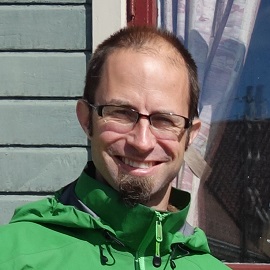
Professor of Geophysics
I have a background in glaciology and geophysics. My research focuses on tidewater glaciers and glacier-ocean interactions, and I am especially interested in the ways that glaciers interact with other Earth system components. I teach the introductory physics courses as well as upper division courses in Earth's climate and glaciology.
View profile and contact infoEran Hood, Ph.D.
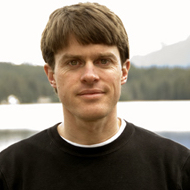
Professor of Environmental Science, Natural Sciences Department Chair
View profile and contact infoJason B. Fellman, Ph.D.
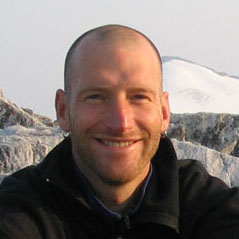
Director - Alaska Coastal Rainforest Center & Research Associate Professor of Environmental Science
View profile and contact infoSonia A. Nagorski, Ph.D. (she/her)
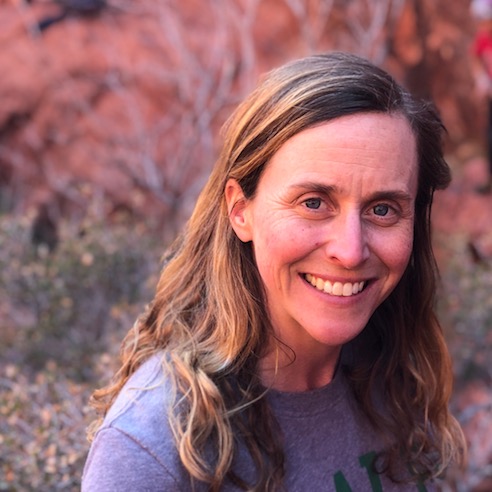
Associate Professor of Geology
My background is in environmental geochemistry, and my research has focused primarily on a variety of contaminants in aquatic systems. I teach classes on Earth's geologic history, physical geology, natural hazards, geomorphology, and mineral and energy resources and environmental impacts. At UAS I devote my efforts to training and inspiring undergraduates to work creatively and effectively in the environmental sciences, preparing them for meaningful careers that benefit the Earth and society.
Nicole Abib, Ph.D. (she/her, they/them)
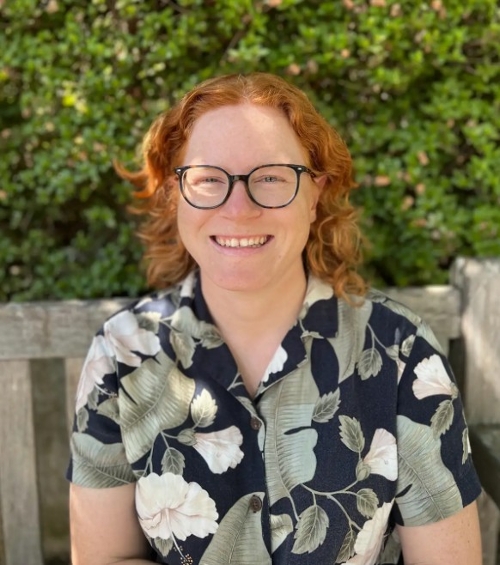
Assistant Professor of Earth Sciences
View profile and contact infoLogan Berner, Ph.D. (he/him)
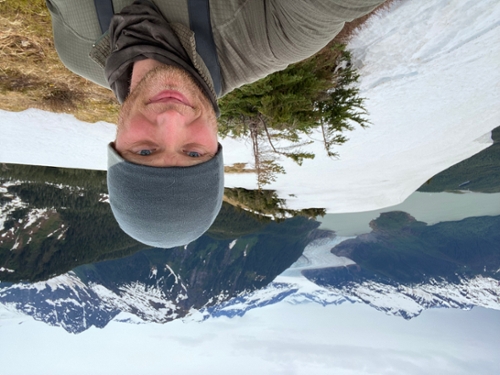
Assistant Professor of Forest Ecology
Emeritus Faculty
Roman Motyka, Ph.D.
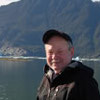
Research Professor Emeritus, Geophysical Institute, UAF
View profile and contact info